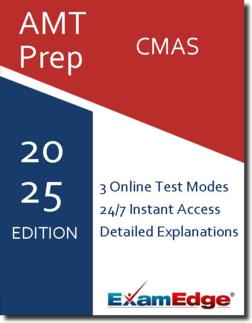AMT CMAS (CMAS) Practice Tests & Test Prep by Exam Edge - Topics
Based on 37 Reviews
- Real Exam Simulation: Timed questions and matching content build comfort for your AMT CMAS test day.
- Instant, 24/7 Access: Web-based AMT Certified Medical Administrative Specialist practice exams with no software needed.
- Clear Explanations: Step-by-step answers and explanations for your AMT exam to strengthen understanding.
- Boosted Confidence: Reduces anxiety and improves test-taking skills to ace your AMT Certified Medical Administrative Specialist (CMAS).

Understanding the exact breakdown of the AMT Certified Medical Administrative Specialist test will help you know what to expect and how to most effectively prepare. The AMT Certified Medical Administrative Specialist has multiple-choice questions The exam will be broken down into the sections below:
| AMT Certified Medical Administrative Specialist Exam Blueprint | ||
|---|---|---|
| Domain Name | % | Number of Questions |
| Anatomy and Physiology | 11% | 11 |
| Medical Office Management - General Office Procedures | 10% | 10 |
| Medical Office Management - Bookkeeping | 4% | 4 |
| Medical Office Management - Insurance Processings | 4% | 4 |
| Medical Procedures | 12% | 12 |
| Patient Examination | 12% | 12 |
| Phlebotomy | 11% | 11 |
| Diagnostic Testing: ECG and other Lab Procedures | 12% | 12 |
| Medical Terminology | 12% | 12 |
| Pharmacology | 12% | 12 |


